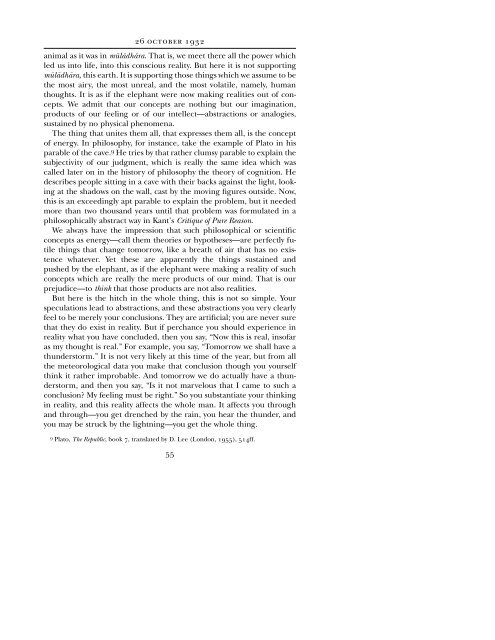CG JUNG - Countryside Anarchist
CG JUNG - Countryside Anarchist
CG JUNG - Countryside Anarchist
You also want an ePaper? Increase the reach of your titles
YUMPU automatically turns print PDFs into web optimized ePapers that Google loves.
26 OCTOBER 1932<br />
animal as it was in mÖlvdhvra. That is, we meet there all the power which<br />
led us into life, into this conscious reality. But here it is not supporting<br />
mÖlvdhvra, this earth. It is supporting those things which we assume to be<br />
the most airy, the most unreal, and the most volatile, namely, human<br />
thoughts. It is as if the elephant were now making realities out of concepts.<br />
We admit that our concepts are nothing but our imagination,<br />
products of our feeling or of our intellect—abstractions or analogies,<br />
sustained by no physical phenomena.<br />
The thing that unites them all, that expresses them all, is the concept<br />
of energy. In philosophy, for instance, take the example of Plato in his<br />
parable of the cave. 9 He tries by that rather clumsy parable to explain the<br />
subjectivity of our judgment, which is really the same idea which was<br />
called later on in the history of philosophy the theory of cognition. He<br />
describes people sitting in a cave with their backs against the light, looking<br />
at the shadows on the wall, cast by the moving figures outside. Now,<br />
this is an exceedingly apt parable to explain the problem, but it needed<br />
more than two thousand years until that problem was formulated in a<br />
philosophically abstract way in Kant’s Critique of Pure Reason.<br />
We always have the impression that such philosophical or scientific<br />
concepts as energy—call them theories or hypotheses—are perfectly futile<br />
things that change tomorrow, like a breath of air that has no existence<br />
whatever. Yet these are apparently the things sustained and<br />
pushed by the elephant, as if the elephant were making a reality of such<br />
concepts which are really the mere products of our mind. That is our<br />
prejudice—to think that those products are not also realities.<br />
But here is the hitch in the whole thing, this is not so simple. Your<br />
speculations lead to abstractions, and these abstractions you very clearly<br />
feel to be merely your conclusions. They are artificial; you are never sure<br />
that they do exist in reality. But if perchance you should experience in<br />
reality what you have concluded, then you say, “Now this is real, insofar<br />
as my thought is real.” For example, you say, “Tomorrow we shall have a<br />
thunderstorm.” It is not very likely at this time of the year, but from all<br />
the meteorological data you make that conclusion though you yourself<br />
think it rather improbable. And tomorrow we do actually have a thunderstorm,<br />
and then you say, “Is it not marvelous that I came to such a<br />
conclusion? My feeling must be right.” So you substantiate your thinking<br />
in reality, and this reality affects the whole man. It affects you through<br />
and through—you get drenched by the rain, you hear the thunder, and<br />
you may be struck by the lightning—you get the whole thing.<br />
9 Plato, The Republic, book 7, translated by D. Lee (London, 1955), 514ff.<br />
55


